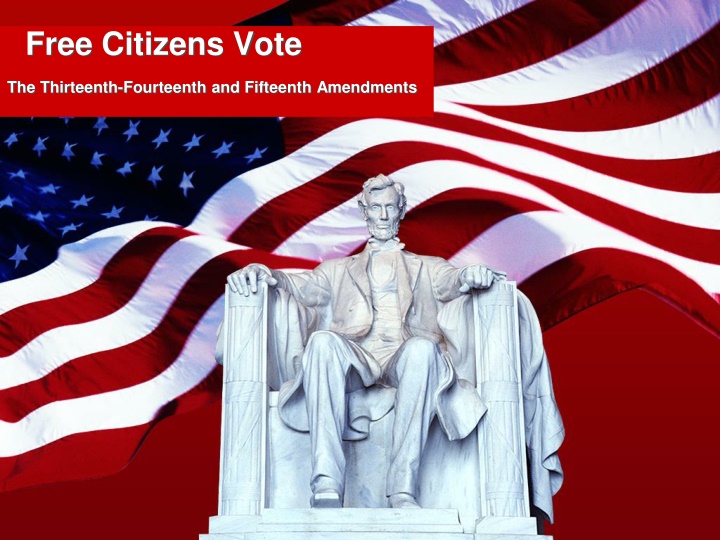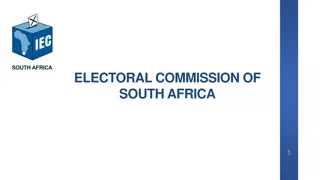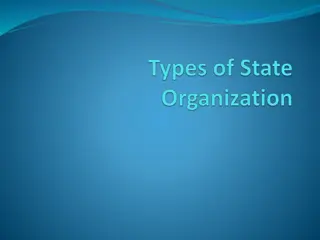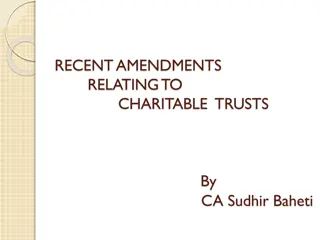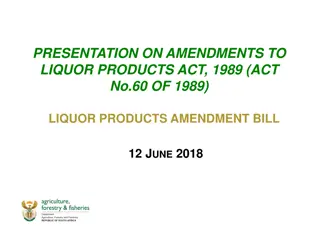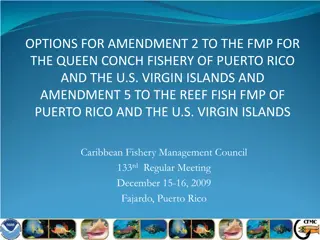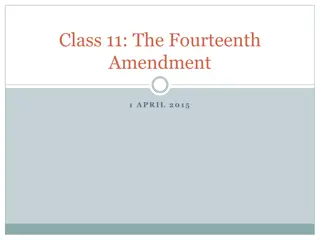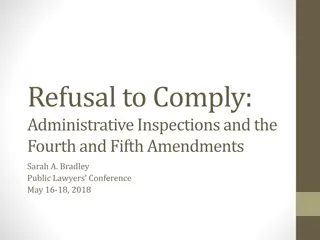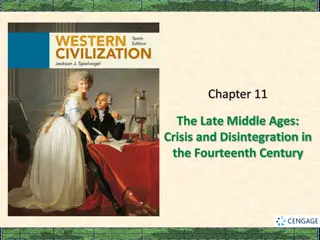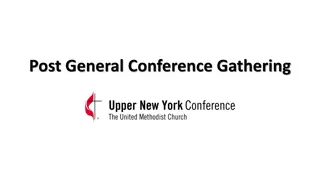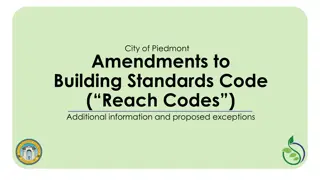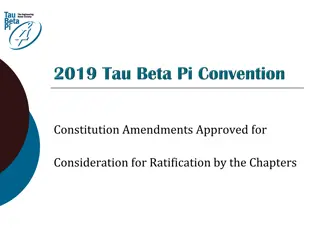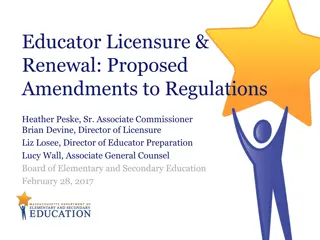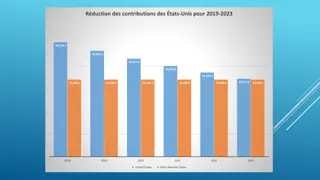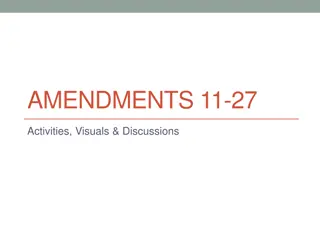Impact of the Thirteenth, Fourteenth, and Fifteenth Amendments in the United States
The Thirteenth Amendment abolished slavery, the Fourteenth granted citizenship and equal protection under the law to all persons, and the Fifteenth protected voting rights regardless of race. These amendments reshaped American society by ending slavery, ensuring equal rights for former slaves, and prohibiting racial discrimination in voting, marking significant progress towards equality and civil rights.
Download Presentation

Please find below an Image/Link to download the presentation.
The content on the website is provided AS IS for your information and personal use only. It may not be sold, licensed, or shared on other websites without obtaining consent from the author.If you encounter any issues during the download, it is possible that the publisher has removed the file from their server.
You are allowed to download the files provided on this website for personal or commercial use, subject to the condition that they are used lawfully. All files are the property of their respective owners.
The content on the website is provided AS IS for your information and personal use only. It may not be sold, licensed, or shared on other websites without obtaining consent from the author.
E N D
Presentation Transcript
Free Citizens Vote The Thirteenth-Fourteenth and Fifteenth Amendments
Warm up 2 Minute Write These are your new laws for this school. You are required to follow these laws starting RIGHT NOW! You are NOT to EVER use any type of portable electronic devices. You are NOT allowed to drink anything but water. You must be home by dark and stay there, or you will be arrested. Nothing belongs to you not your clothes, shoes or backpacks. You have two minutes to write about how these new laws make you feel.
Thirteenth Amendment Section 1. Neither slavery nor involuntary servitude, except as a punishment for crime whereof the party shall have been duly convicted, shall exist within the United States, or any place subject to their jurisdiction. Section 2. Congress shall have power to enforce this article by appropriate legislation.
Thirteenth Amendment Section 1. Neither slavery nor involuntary servitude, except as a punishment for crime whereof the party shall have been duly convicted, shall exist within the United States, or any place subject to their jurisdiction. Section 2. Congress shall have power to enforce this article by appropriate legislation. Section 1 Abolished slavery (freed the slaves) Section 2 Congress can pass laws to enforce this amendment.
Fourteenth Amendment Section. 1. All persons born or naturalized in the United States and subject to the jurisdiction thereof, are citizens of the United States and of the State wherein they reside nor deny to any person the equal protection of the laws. Section. 5. The Congress shall have power to enforce this article by appropriate legislation.
Fourteenth Amendment Section. 1. All persons born or naturalized in the United States and subject to the jurisdiction thereof, are citizens of the United States and of the State wherein they reside nor deny to any person the equal protection of the laws. Section. 5. The Congress shall have power to enforce this article by appropriate legislation. Section 1 Former slaves are now citizens of the United States and are to be treated the same as other citizens under the law. Section 5- Congress can pass laws to enforce this amendment.
Fifteenth Amendment Section. 1. The right of citizens of the United States to vote shall not be denied or abridged by the United States or by any State on account of race, color, or previous condition of servitude. Section. 2. The Congress shall have power to enforce this article by appropriate legislation.
Fifteenth Amendment Section. 1. The right of citizens of the United States to vote shall not be denied or abridged by the United States or by any State on account of race, color, or previous condition of servitude. Section. 2. The Congress shall have power to enforce this article by appropriate legislation. Section 1 People can not be denied the right to vote because of race. Section 2 Congress can pass laws to enforce this amendment.
Thirteenth Amendment (December, 1865) Positive Effects + Slavery is abolished and slaves are freed. Negative Effects - The Ku Klux Klan is formed (1866) Freedman's Bureau is established. (1865) The Freedman s Bureau promises 40 acres and a mule, but does not deliver. Institutions of higher education are founded for African Americans The economic system of the South is disrupted.
Fourteenth Amendment (1868) Negative Effects - Positive Effects + Congress uses the 14th Amendment to prohibit discrimination in public places. The failure to enforce the Fourteenth Amendment leads to segregation (separate arrangements). Former slaves receive American citizenship. States are prohibited from denying citizens their rights.
Fifteenth Amendment (1870) Positive Effects + African Americans can now vote. Negative Effects - Women are still denied the right to vote. African Americans are elected to political office. Southern states still find ways to keep citizens from voting, such as poll taxes, grandfather clauses, and literacy tests. For the first time, Congress attempts to prohibit the intimidation of voters. The South is required to ratify the 15thAmendment to be readmitted into the Union. The South forced to ratify the 15thAmendment to be readmitted into the Union.
Scenario 1 Frederick Jefferson, an African American male, was elected to the U.S. Senate representing the state of Mississippi.
Scenario 2 Sally Washington, a former slave, is not afraid of being sold away from her children.
Scenario 3 In Atlanta, Georgia, a law is passed that requires African Americans to be indoors after sundown.
Scenario 4 Lamar Miller, an African American male, graduates from Howard University with a law degree.
Scenario 5 Sissy Jackson, a 12 year old African American girl, attends school with her sisters to learn to read and write.
Scenario 6 Although they are no longer slaves, the Jones family cannot find work other than farming on their former owner s land.
Scenario 7 Bedford Jones, a former slave, could not vote in Alabama s city election because he did not have enough money to pay the voting tax.
Scenario 8 Tom and Mary Davidson, former slaves, are by law, citizens of the United States.
Scenario 1 KEY Frederick Jefferson, an African American male, was elected to the U.S. Senate representing the state of Mississippi. 15thAmendment - Success
Scenario 2 KEY Sally Washington, a former slave, is not afraid of being sold away from her children. 13thAmendment-Success
Scenario 3 KEY In Atlanta, Georgia, a law is passed that requires African Americans to be indoors after sundown. 14thAmendment - Failure
Scenario 4 KEY Lamar Miller, an African American male, graduates from Howard University with a law degree. 13thAmendment- Success
Scenario 5 KEY Sissy Jackson, a 12 year old African American girl, attends school with her sisters to learn to read and write. 13thAmendment- Success
Scenario 6 KEY Although they are no longer slaves, the Jones family cannot find work other than farming on their former owner s land. 13thAmendment- Failure
Scenario 7 KEY Bedford Jones, a former slave, could not vote in Alabama s city election because he did not have enough money to pay the voting tax . 15thAmendment- Failure
Scenario 8 KEY Tom and Mary Davidson, former slaves, are by law, citizens of the United States. 14thAmendment - Success
Exit Slip The 13th, 14th, and 15th Amendments changed life in the United States by ..
Free Citizens Vote The Thirteenth-Fourteenth and Fifteenth Amendments
